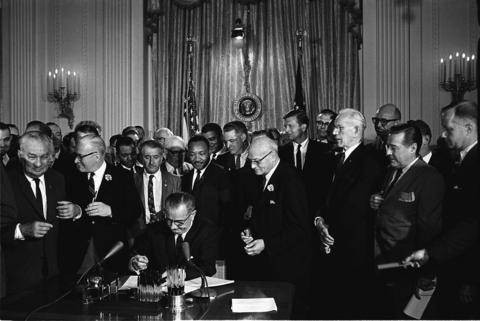
Fifty-one summers ago, amid a tense Alabama day that teemed with the specter of violence and bloodshed, Attorney General Robert F. Kennedy’s dispatched dignitaries convinced Gov. George Wallace (famous for his “segregation now, segregation tomorrow and segregation forever” speech) to step aside and allow the first black man to desegregate the University of Alabama.
Later that same June day in 1963, at RFK’s urging, his older brother President John F. Kennedy put his presidency on the line when he told the nation in a televised address that the fight for civil rights was “as old as the Scriptures and as clear as the Constitution.” He then outlined to the nation his plans to send his Civil Rights Bill through Congress with “the proposition that race has no place in American life or law.”
The very next day, on June 12, famed civil rights activist Medgar Evers was assassinated in Jackson, Miss., by a member of a white supremacist group in the driveway of his home. The very next year, the blood of Evers and countless others was used to pay down the signing of the landmark Civil Rights Bill at the White House in July of 1964. President Lyndon B. Johnson who skillfully took the civil rights baton after Kennedy’s assassination, signed the legislation into law with Dr. Martin Luther King and other senators flanking him.
Five decades later and hundreds of miles from the site of those separate but equally important events, The King Center in Atlanta facilitated the 50th anniversary of the passage of the Civil Rights Bill.
The program, “The Civil Rights Act @ 50: Looking Back/Moving Forward,” will feature King Center CEO Dr. Bernice A. King, daughter of Dr. Martin Luther King, Jr. and Mrs. Coretta Scott King; and,luminaries such as Ambassador Andrew Young, Dr. C.T. Vivian, Dr. Joseph Lowery, and Atlanta Mayor Kasim Reed. In addition, esteemed musicians Lily Patel, Terence Harper, Marshall Isseks, James Robertson, Terry Harper, Dishan Harper, and Henry Conerway II will perform. Monica Pearson is the emcee for the event.
“Despite the difficulties and obstacles that remain on our path to the Beloved Community of my father’s dream, the Civil Rights Act of 1964 made possible tremendous strides toward a more just nation,” said Dr. Bernice A. King., the youngest child of Dr. Martin Luther King Jr. and Coretta Scott King.
King repeated one of her favorite quotes from her mother; “Struggle is a never-ending process. Freedom is never really won,” she said, remembering all the struggle, pain, bloodshed and death that went into the signing of the bill, including the Montgomery Bus Boycott, the Student Sit Ins, the assassinations, hanging and bombings of civil rights workers.
“You earn it and win it in every generation. We must guard and protect our freedoms in every generation,” King added.
The Civil Rights Act of 1964 ushered in a new wave of democracy and freedom. It also confirmed a national shift for human rights. It proved to be historic legislation which profoundly transformed America for the better in a myriad of ways.
Civil rights leader and former U.S. Ambassador Andrew Young says while there is still racism in America, a lot has changed.
“Though we feel now that we still have problems, the truth of it is if Martin Luther King had known 50 years ago that we would be where we are today, he would be very, very pleased,” said Young. “I think if I had said to him ‘I think I’m going to be the Mayor of Atlanta, and I’m going to be an Ambassador to the United Nations. And I’m going to help a Georgia Governor get to the White House’ he would say ‘Boy, you are sick!’ ”
“Legal racism no longer exists. Now that doesn’t mean that prejudice, color prejudice, class prejudice no longer exists,” Young. “It exists in my family, in your family. We still have our individual idiosyncrasies. But legal racism just is not here anymore.”
In addition to barring unequal application of voter registration requirements, the Civil Rights Act of 1964: outlaws discrimination based on race, color, religion or national origin in hotels, motels, restaurants, theaters, and all other public accommodations engaged in interstate
commerce; prohibits state and municipal governments from denying access to public facilities on grounds of race, color, religion or national origin, and prevents discrimination by government agencies that receive federal funds.
“There’s a cover over it [Civil Rights Movement] right now because they are trying to take away the essence of it. So that means we’ll have to struggle and do some fighting like we did back then,” said C.T. Vivian, the famed civil rights activist who worked closely with Dr. Martin Luther King, Jr.
